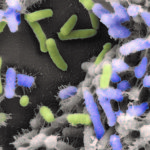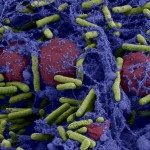Link to Pubmed [PMID] – 24492362
Link to HAL – pasteur-01400181
Link to DOI – 10.1128/AAC.02142-13
Antimicrobial Agents and Chemotherapy, 2014, 58 (4), pp.2221 - 2228. ⟨10.1128/AAC.02142-13⟩
The rising number of infections caused by biofilm formation and the difficulties associated with their treatment by conventional antimicrobial therapies have led to an intensive search for novel antibiofilm agents. Dermaseptins are antimicrobial peptides with a number of attractive properties that might offer alternative therapies against resistant microorganisms. In this study, we synthesized a set of dermaseptin-derived peptides and evaluated their activities against Gram-positive and Gram-negative bacterial biofilm formation. All dermaseptin-derived peptides demonstrated concentration-dependent antibiofilm activities at microgram concentrations, and their activities were dependent on the nature of the peptides, with the highest levels of activity being exhibited by highly charged molecules. Fluorescent binding and confocal microscopy demonstrated that dermaseptin K4S4, a substituted derivative of the native molecule S4, significantly decreased the viability of planktonic and surface-attached bacteria and stopped biofilm formation under dynamic flow conditions. Cytotoxicity assays with HeLa cells showed that some of the tested peptides were less cytotoxic than current antibiotics. Overall, these findings indicate that dermaseptin derivatives might constitute new lead structures for the development of potent antibiofilm agents.




